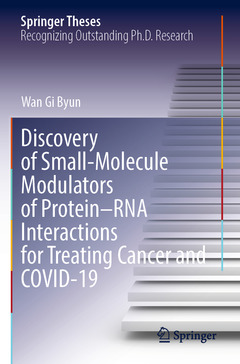Discovery of Small-Molecule Modulators of Protein–RNA Interactions for Treating Cancer and COVID-19, 1st ed. 2023 Springer Theses Series
Auteur : Byun Wan Gi

This book describes the development of novel protein?RNA-binding assays and their applications in a high-throughput manner for the identification of small-molecule modulators of protein?RNA interactions to treat cancer and COVID-19.
Modulating protein?RNA interactions with small molecules is expected to provide novel biological insights of the interrelation of diseases with the protein?RNA interactome. The modulations may also be exploited therapeutically. For these reasons, the development of a simple, reliable, and sensitive protein?RNA-binding assay is necessary for high-throughput screening to discover new effective chemical entities capable of acting on diverse protein?RNA interactions. This book discusses the discovery of small-molecule modulators targeting protein?RNA interactions that are potentially valuable to treat cancer and COVID-19 by constructing novel high-throughput screening methods. The results of this dissertation provide valuable insights into the regulation of protein?RNA interactions in chemical biology and drug development.
Chapter 1. Introduction............................................................................ 1
1.1. Protein–RNA interaction.............................................................. 1
1.2. Therapeutic potentials of modulating PRI.................................... 1
1.3. Chemical biology approaches for the discovery of PRI modulator
............................................................................................................. 3
1.4. Aims and scope of the thesis........................................................ 5
1.5. References.................................................................................... 5
Chapter 2. Identification of Small-Molecule Inhibitors of Oncogenic Lin28–Let-7 Interaction 8
2.1. Discovery of a small-molecule inhibitor of protein–microRNA interaction using binding assay with a site-specifically labeled Lin28..................................................................... 8
2.1.1. Introduction..................................................................... 8
2.1.2. Results and discussion................................................... 11
2.1.3. Conclusion..................................................................... 26
2.1.4. Experimental section..................................................... 27
2.1.5. References..................................................................... 37
2.2. Restoring let‑7 microRNA biogenesis using a small-molecule inhibitor of the protein–RNA interaction................................................................................................................... 41
2.2.1. Introduction................................................................... 41
2.2.2. Results and discussion................................................... 43
2.2.3. Conclusion..................................................................... 53
2.2.4. Experimental section..................................................... 53
2.2.5. References..................................................................... 58
Chapter 3. Discovery of Small-Molecule Modulators of Protein–RNA Interactions by Fluorescence Intensity-Based Binding Assay............................................................... 61
3.1. Introduction................................................................................ 61
3.2. Results and discussion................................................................ 63
3.3. Conclusion.................................................................................. 76
3.4. Experimental section.................................................................. 76
3.5. References.................................................................................. 85
Chapter 4. Identification of Protein–RNA Interaction Modulators for Treating COVID-19 88
4.1. Harnessing stress granule formation by small molecules to inhibit the cellular replication of SARS-CoV-2......................................................................................................... 88
4.1.1. Introduction................................................................... 88
4.1.2. Results and discussion................................................... 89
4.1.3. Conclusion................................................................... 103
4.1.4. Experimental section................................................... 104
4.1.5. References.................................................................... 110
4.2. Discovery of a small-molecule degrader of SARS-CoV-2 Nsp1 by autophagic pathway 112
4.2.1. Introduction.................................................................. 112
4.2.2. Results and discussion................................................. 113
4.2.3. Conclusion................................................................... 119
4.2.4. Experimental section................................................... 119
4.2.5. References 121Discusses in detail the therapeutic significances of protein–RNA interaction modulators
Highlights the development of protein–RNA-binding assays
Examines in detail how protein–RNA interaction modulators can act as therapeutic agents
Date de parution : 12-2023
Ouvrage de 128 p.
15.5x23.5 cm
Date de parution : 12-2022
Ouvrage de 128 p.
15.5x23.5 cm



